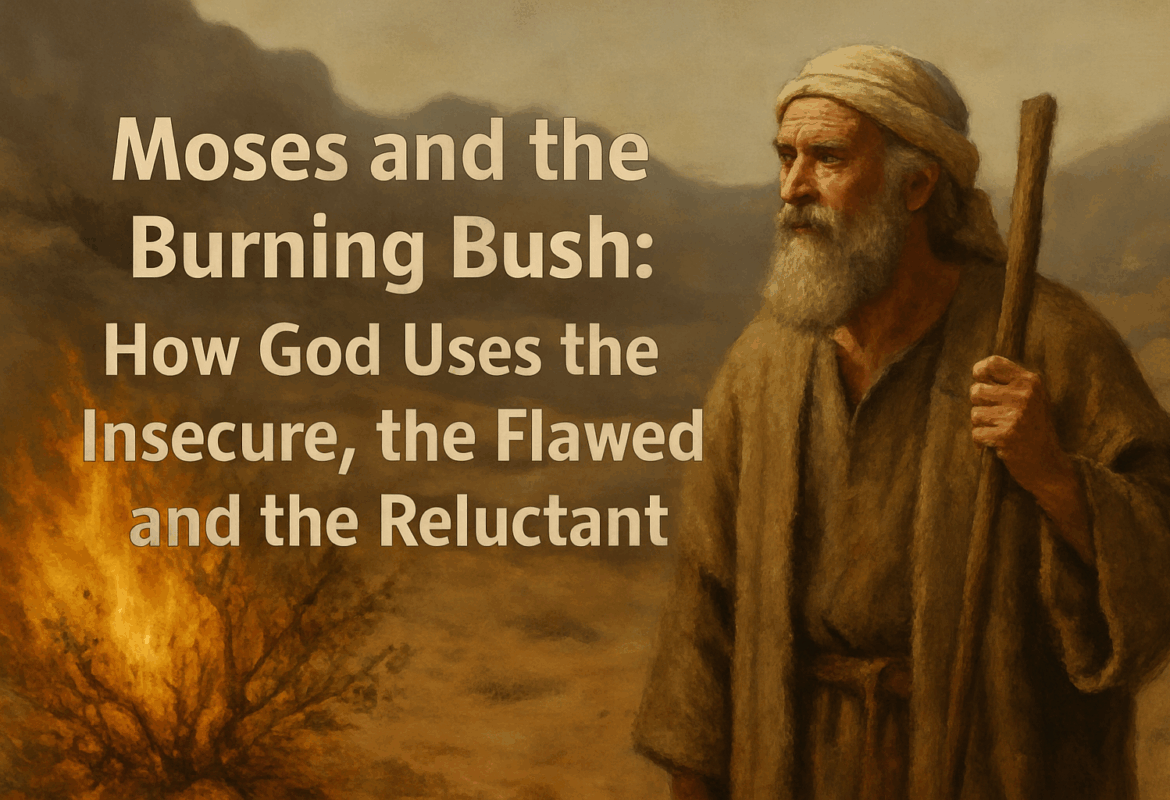Moses and the Burning Bush: How God Uses the Insecure, the Flawed, and the Reluctant
Growing up, you may have read about Moses and the burning bush but I want to share ways we resemble this biblical giant. Have you ever felt unqualified for something God (or life!) seems to be calling you to do?
If so, you’re not alone. Long before he became the bold leader of Israel, Moses stood before a burning bush, full of insecurities, fear, and excuses. Yet, God didn’t dismiss him—instead, He called him because of who he was, not in spite of it.
Let’s look at the story of Moses and the burning bush and see how this ancient encounter speaks powerfully to us today.
Moses and the Burning Bush: A Quick Recap
When Moses stumbled upon the burning bush in the wilderness of Midian, it wasn’t just a spectacle—it was a divine appointment.
God called out to him by name and revealed a world-changing mission:
“I have seen the misery of My people in Egypt… So now, go. I am sending you to Pharaoh to bring My people the Israelites out of Egypt.” (Exodus 3:7–10)
But Moses didn’t jump up with confidence and say, “Yes, Lord, I’m your guy!” Instead, he had a list of objections—a laundry list of “why not me” statements that sound eerily familiar.
Moses’ Insecurities Sound Like Ours
Let’s take a closer look at Moses’ excuses and how they mirror our own doubts today:
“Who am I that I should go?” (Exodus 3:11)
Translation: “I’m not qualified. I’m not enough.”
Sound familiar? Impostor syndrome is nothing new. Moses had it before it had a name.
“What if they don’t believe me or listen to me?” (Exodus 4:1)
Translation: “What if I fail or get rejected?”
Fear of rejection stops so many of us from stepping into leadership, ministry, or even sharing our faith.
“I am slow of speech and tongue.” (Exodus 4:10)
Translation: “I don’t have the skills.”
Moses may have had a speech impediment or just didn’t see himself as a public speaker. Either way, he thought he was disqualified.
“Please send someone else.” (Exodus 4:13)
Translation: “Can’t somebody else do it?”
Sometimes we know what God is calling us to do—we just don’t want to do it.
God’s Response: “I Will Be With You”
God didn’t deny Moses’ weaknesses. He didn’t give him a pep talk about how great he secretly was. Instead, He gave Moses something better: His presence.
“I will be with you.” (Exodus 3:12)
God reminds Moses—and us—that it’s not about our ability, but His. God doesn’t need perfect people. He uses willing hearts, even when they’re trembling.
What This Means for Us Today
We all stand before our own “burning bush” moments. These are the times when God calls us to something bigger than we think we can handle—whether that’s leading a Bible study, switching careers, healing a relationship, or stepping into a role we don’t feel ready for.
The story of Moses and the burning bush teaches us:
- God calls ordinary people. You don’t have to be a spiritual giant. Moses was a fugitive shepherd with a stutter.
- Our weaknesses don’t disqualify us. In fact, they can become the very places God shows His strength.
- God equips those He calls. He gave Moses the words, signs, and support he needed (hello, Aaron!).
- Obedience matters more than confidence. You don’t have to feel ready to say yes.
How to Apply This Message to Your Life
Here are a few questions to reflect on this week:
- What has God placed on your heart that feels too big or scary?
- Are you making excuses like Moses, trying to dodge your calling?
- Can you trust that God will be with you—even if you don’t feel capable?
Try journaling your fears and offering them to God. Pray, “Lord, I feel like Moses right now—but if You’re calling me, help me to say yes.”
Final Thought about The Burning Bush and Moses
The story of Moses and the burning bush is more than a Sunday School tale—it’s a reminder that God specializes in using reluctant, flawed, and insecure people (like us) to do amazing things.
So next time you feel like you’re not enough, remember: you’re in good company. Moses felt the same way—and God still used him to part seas and set a nation free.
Imagine what He might do with your yes.
In Christ,
Bob
The next reading from this series shows how Moses wandered in the wilderness–and what he did during those 40 years.
Discover more from Making Christ Known
Subscribe to get the latest posts sent to your email.
